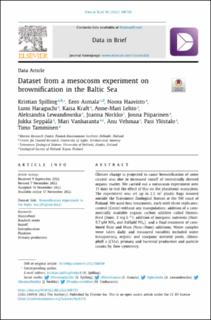Dataset from a mesocosm experiment on brownification in the Baltic Sea
Spilling, Kristian; Asmala, Eero; Haavisto, Noora; Haraguchi, Lumi; Kraft, Kaisa; Lehto, Anne-Mari; Lewandowska, Aleksandra; Norkko, Joanna; Piiparinen, Jonna; Seppälä, Jukka; Vanharanta, Mari; Vehmaa, Anu; Ylöstalo, Pasi; Tamminen, Timo
Peer reviewed, Journal article
Published version
Permanent lenke
https://hdl.handle.net/11250/3115196Utgivelsesdato
2022Metadata
Vis full innførselSamlinger
Originalversjon
Spilling, K., Asmala, E., Haavisto, N., Haraguchi, L., Kraft, K., Lehto, A.-M., Lewandowska, A., Norkko, J., Piiparinen, J., Seppälä, J., Vanharanta, M., Vehmaa, A., Ylöstalo, P. & Tamminen, T. (2022). Dataset from a mesocosm experiment on brownification in the Baltic Sea. Data in Brief, 45, 108755, 1-12. doi: 10.1016/j.dib.2022.108755Sammendrag
Climate change is projected to cause brownification of some coastal seas due to increased runoff of terrestrially derived organic matter. We carried out a mesocosm experiment over 15 days to test the effect of this on the planktonic ecosystem. The experiment was set up in 2.2 m3 plastic bags moored outside the Tvärminne Zoological Station at the SW coast of Finland. We used four treatments, each with three replicates: control (Contr) without any manipulation; addition of a commercially available organic carbon additive called HuminFeed (Hum; 2 mg L−1); addition of inorganic nutrients (Nutr; 5.7 µM NH4 and 0.65µM PO4); and a final treatment of combined Nutr and Hum (Nutr+Hum) additions. Water samples were taken daily, and measured variables included water transparency, organic and inorganic nutrient pools, chlorophyll a (Chla), primary and bacterial production and particle counts by flow cytometry. Dataset from a mesocosm experiment on brownification in the Baltic Sea

